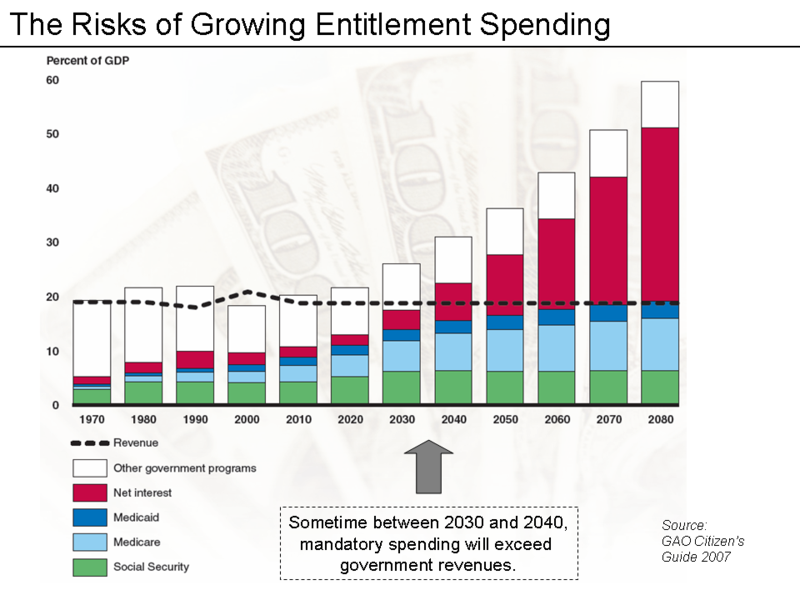Ganesh
DP Veteran
- Joined
- Jun 15, 2014
- Messages
- 2,028
- Reaction score
- 1,329
- Gender
- Undisclosed
- Political Leaning
- Undisclosed
This is a reprint of a letter written to a US newspaper recently. I think it is worth looking at, as it presents a clear summary of actual economic issues facing us today, and discounts the spin of the far right, limit government, cut spending, catastrophe is coming crowd.
"Regarding professor Jack Ochs’ commentary on the U.S. national debt (“A Great Economic Reckoning,” Oct. 16), I take great issue with how he and other economists and pundits characterize our debt as a burden that will cause us to raise future taxes and cut necessary entitlement spending like Social Security and Medicare to maintain solvency.
1. If interest rates go up, it’s because the economy is strong and growing with healthy inflation. Interest payments on the debt as part of the budget are insignificant then. Rates don’t go up in a vacuum. I marvel at how people still don’t make that connection.
2. The U.S. government is nothing like Greece because we issue debt in our own currency and therefore can never run out of it. Investors know this and will never fear that the U.S. Treasury will not pay its debts.
3. Mr. Ochs mentions post-World War I Germany as an example of rampant inflation from money printing. Of course. The country was destroyed and had no productive assets to deploy locally and had to print money to service its debts to other countries. It had no wealth backing. The only way hyperinflation happens is from severe political unrest, coups and civil wars. It never happens in stable, wealthy sovereign currency-issuing countries.
4. He laments demographic effects on the debt and federal expenditures. Japan has a far worse demographic profile than we have, has a 250 percent debt/GDP ratio (ours is 75 percent) and the interest rate on 10-year Japan bonds is 0.50 percent.
Academic and business interests scaring everybody about a coming debt catastrophe have severely limited our politicians’ ability to lower tax rates, increase spending and invest in the kinds of projects and programs that benefit all citizens of this country, put people back to work and foster widespread prosperity.
We don’t need to have hang-ups about our debt because we will always be able to pay it. Always. Fears about the national debt should never be an excuse to limit the capabilities of this country."
"Regarding professor Jack Ochs’ commentary on the U.S. national debt (“A Great Economic Reckoning,” Oct. 16), I take great issue with how he and other economists and pundits characterize our debt as a burden that will cause us to raise future taxes and cut necessary entitlement spending like Social Security and Medicare to maintain solvency.
1. If interest rates go up, it’s because the economy is strong and growing with healthy inflation. Interest payments on the debt as part of the budget are insignificant then. Rates don’t go up in a vacuum. I marvel at how people still don’t make that connection.
2. The U.S. government is nothing like Greece because we issue debt in our own currency and therefore can never run out of it. Investors know this and will never fear that the U.S. Treasury will not pay its debts.
3. Mr. Ochs mentions post-World War I Germany as an example of rampant inflation from money printing. Of course. The country was destroyed and had no productive assets to deploy locally and had to print money to service its debts to other countries. It had no wealth backing. The only way hyperinflation happens is from severe political unrest, coups and civil wars. It never happens in stable, wealthy sovereign currency-issuing countries.
4. He laments demographic effects on the debt and federal expenditures. Japan has a far worse demographic profile than we have, has a 250 percent debt/GDP ratio (ours is 75 percent) and the interest rate on 10-year Japan bonds is 0.50 percent.
Academic and business interests scaring everybody about a coming debt catastrophe have severely limited our politicians’ ability to lower tax rates, increase spending and invest in the kinds of projects and programs that benefit all citizens of this country, put people back to work and foster widespread prosperity.
We don’t need to have hang-ups about our debt because we will always be able to pay it. Always. Fears about the national debt should never be an excuse to limit the capabilities of this country."

